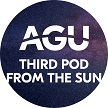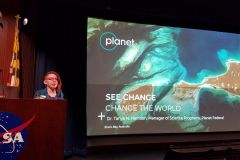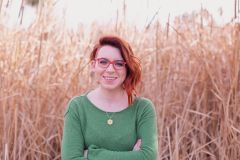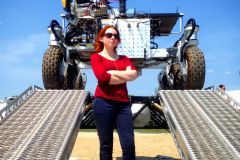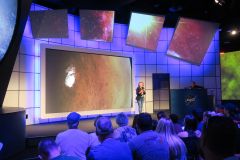3-True story: A Martian on Earth
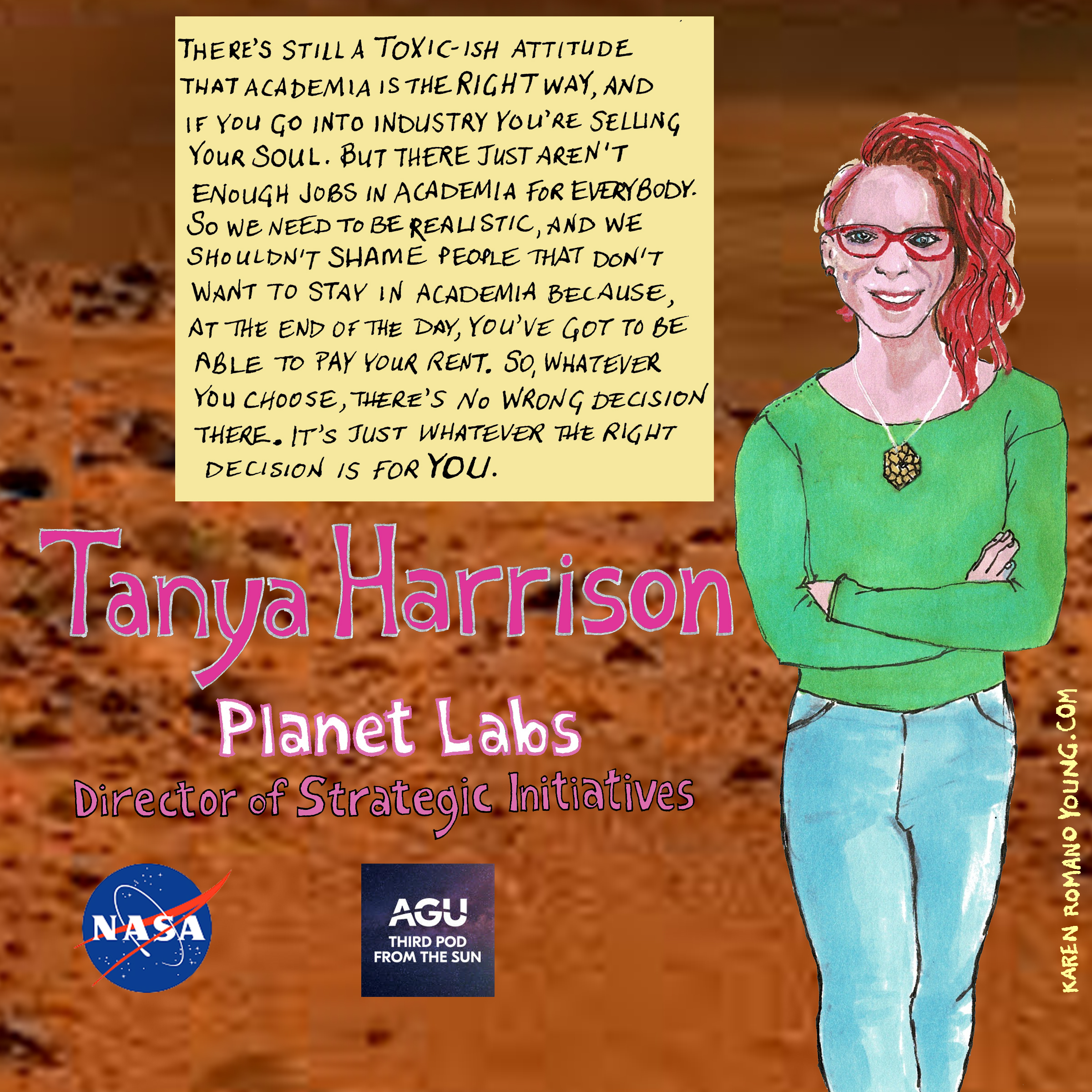 Tanya Harrison never thought she was going to be an astronaut. But she was determined to go to space. And she did just that – through satellites, first to Mars, and now looking back at our own third rock from the Sun as she uses satellites to map places near and far. We talked with her about what it’s like to be a Martian, making science more accessible to those with disabilities, and what it’s like to view some of the most beautiful places on Earth.
Tanya Harrison never thought she was going to be an astronaut. But she was determined to go to space. And she did just that – through satellites, first to Mars, and now looking back at our own third rock from the Sun as she uses satellites to map places near and far. We talked with her about what it’s like to be a Martian, making science more accessible to those with disabilities, and what it’s like to view some of the most beautiful places on Earth.
This episode was produced by Shane M Hanlon and mixed by Collin Warren. Artwork by Karen Romano Young. Interview conducted by Ashely Hamer.
Shane Hanlon: 00:00 Hi, Nancy.
Nanci Bompey: 00:01 Hi, Shane.
Shane Hanlon: 00:02 I don’t have a “What’s your favorite question,” this week.
Nanci Bompey: 00:04 Good. I’m so happy because that question is not my favorite.
Shane Hanlon: 00:08 I do have a question for you though, which also might not be your favorite. What did you want to be when you grow up?
Nanci Bompey: 00:15 Oh, that’s a good one. No, that is a good one.
Shane Hanlon: 00:17 Yeah.
Nanci Bompey: 00:17 When I was young, I actually wanted to be an architect.
Shane Hanlon: 00:19 Oh.
Nanci Bompey: 00:20 Yeah.
Shane Hanlon: 00:21 That’s interesting.
Nanci Bompey: 00:22 Yeah.
Shane Hanlon: 00:22 Do you remember what drove that?
Nanci Bompey: 00:24 I don’t know. I used to love to make little architectural drawings of houses and stuff. I was really into it. Honestly, I took an architecture class in college, and I don’t know. I gave up on that. Went the science route, but I don’t know. I really enjoyed it. I should’ve… See? Oh, well.
Shane Hanlon: 00:43 If you did that, you wouldn’t be here with me. That’s all that really matters.
Nanci Bompey: 00:48 Right.
Shane Hanlon: 00:53 I think back on this, and I didn’t have a dream growing up. I don’t think I was really ambitious until college. Then I was, “Oh, I want to be a scientist.” These days, I have no idea.
Nanci Bompey: 01:04 Oh, yeah. I say that now, but I still don’t know what I want to be when I actually grow up.
Shane Hanlon: 01:09 Yeah. It turns out, I guess, I’m trying to be a podcaster. I feel like young me would be so disappointed. Not a firefighter, not a doctoral, or not an MD at least, or even an astronaut. Right? Podcaster.
Nanci Bompey: 01:23 Right.
Automated: 01:29 Science is fascinating, but don’t just take my word for it. Join us as we hear stories from scientists for everyone. I’m Shane Hanlon, and I’m Nanci Bompey, and this is Third Pod From the Sun.
Shane Hanlon: 01:44 Okay. I took you back to your childhood aspirations, which were very commendable, I have to say.
Nanci Bompey: 01:50 Thank you.
Shane Hanlon: 01:51 Super impressive because today we’re talking with someone who didn’t necessarily want to become an astronaut, but knew that they wanted to do something with space.
Nanci Bompey: 02:02 I know how you love space as well.
Shane Hanlon: 02:05 Okay. Here’s the deal, right? If you’ve been listening for a while, you know that I’ve had some unfair feelings on space. That was then, and this is now. New podcast, new year, new feelings, and frankly, excitement about space. I’m here for all of the new telescopes and all of that. I have turned over a new leaf, and so very excited to hear more about space. Without further ado, let’s get into it. Our interviewer was Ashley Hamer.
Tanya Harrison: 02:38 I’m Tanya Harrison. I am the Director of Strategic Science Initiatives at Planet Labs.
Ashley Hamer: 02:46 Nice. What is that? What do you do there?
Tanya Harrison: 02:49 It’s kind of all over the place, in a good way. There’s so many different people doing so many different types of research that you could have a meeting in the morning about saving walruses in Alaska, and then you have another meeting later where you’re talking about coral reefs in the south Pacific, and then you’re talking to someone about volcanoes, and then you’re talking about marine plastic debris, tracking trash in the ocean. It’s really amazing. It’s so different from being in my old life as a researcher where I was focused on one specific thing. Now I get to interact with a ton of researchers doing anything you could possibly think of, and that’s really, really exciting.
Ashley Hamer: 03:29 All of that with satellite imagery and data about our planet. You can see the coral reefs, you can see the walrus populations with satellites?
Tanya Harrison: 03:39 Yeah. You can see all of these things from space, which is pretty amazing.
Ashley Hamer: 03:43 That’s awesome. Just to step back, what is it that drew you to science in the first place?
Tanya Harrison: 03:51 There was a coming together of a bunch of things around the age of five that I think were all super influential. One was growing up watching a lot of Star Trek. Another was The Magic School Bus Lost in the Solar System book. I actually have the copy from when I was four or five years old on my bookshelf behind me, still. Randomly, the movie, Big Bird in Japan, which does not sound like it would be space related at first, but in the movie, Big Bird ends up meeting Kaguya-Hime who is the mythological Princess of the Moon in Japan. There’s actually a Kaguya mission named after this princess that the Japanese [inaudible 00:04:28], and she’s sent to the moon. For some reason that caused me to go out every night, and I would stare at the moon and stare at the stars.
Tanya Harrison: 04:35 It kind of evolved from there. Then I focused in on Mars, specifically, when the Pathfinder mission landed, and the little Sojourner Rover drove out onto the surface of Mars. I thought, “That’s so cool. I can’t believe that we’re driving robots on another planet. I want to work on that.” I became super focused. I was, “I got to figure out what I got to do to work on these rovers.”
Tanya Harrison: 05:02 When I was young, I wasn’t really encouraged to go down this pathway because the thought was, “Well, if you want to work in space, you have to be an astronaut. You’re probably not going to be an astronaut because I have a physical disability.” I was never going to make it through the test to become an astronaut. I knew that, but there weren’t a lot of other options shown to you about ways that you could work in the space sector. Now that you have access to things like social media, where you can see tons of amazing women working on these projects and just the diversity of jobs that are out there, that was something that we didn’t really have even five, 10 years ago. I think there’s been a revolution there for people to see all the different ways that they can get involved in space, whether it’s engineering, or being a photographer that photographs launches, or an artist that does renderings of exoplanets. There’s so many different opportunities out there now.
Tanya Harrison: 06:01 I have a condition called ankylosing spondylitis, which is an inflammatory, or arthritic, condition where your body decides that certain connective tissues are bad and eats away at them. Then since it can’t replace them, it starts to replace them with bone instead, so you end up with joints fusing together and stuff like that. It’s not fun.
Tanya Harrison: 06:23 Certainly as a geologist, it was tricky because geology is a very physical field. You tend to go out on field trips for school. They want you to hike for miles, or climb up mountains, or scale rocks. I couldn’t do any of those things so I felt like I was missing out in a lot of settings. In field courses, I didn’t feel like I was gaining everything that I should be. I either physically couldn’t do what they wanted me to do so I’d be left in a van somewhere while everybody else would go off to their site, and I would just wait for hours, or I would try to do stuff, and then find out part way I couldn’t do it. Someone would carry me back from the field. It’s a good bonding experience, I guess, with your classmates, but you know, also embarrassing at the same time. You shouldn’t have to do that. There’s ways to design these courses where they are more accessible to people that are not physically able to hike for miles and miles on end.
Ashley Hamer: 07:19 Right. I mean, it strikes me that satellite imagery is very accessible. Do you find that maybe, as technology has improved, things are getting more accessible for science?
Tanya Harrison: 07:28 Absolutely. The fact that we have really high resolution data from space, it’s certainly not a complete replacement for going out in the field somewhere. I mean, that’s why we send rovers to Mars, on top of satellites. Having that on-the-ground data is really helpful, but you can still tell a lot of the story in a ton of different settings from the satellite imagery. It’s really revolutionary to be able to sit at your desk and do a lot of geology rather than going out into the field.
Ashley Hamer: 08:02 I’m a big fan of space myself. I know that the emotion that I feel when I think about space, that’s different than other areas of science, is awe because it’s so big, and we’re so small in it. Is that your main emotion about space, or is there other appeal for you?
Tanya Harrison: 08:21 That’s a good question. Certainly the sense of awe I think is the big attractor because it seems so extraordinary and things that you wouldn’t encounter on a day-to-day basis. We’re kind of fascinated as humans about things that are exotic, and we don’t quite understand them, like dark matter or antimatter, or planets where you have volcanoes that are spewing sulfur, or gas giants where there’s no surface. We could never live there, but you wonder what’s going on underneath all the clouds. I think it’s something that really sparks curiosity for folks compared to the day-to-day. I don’t want to say it’s not as engaging, but it’s not engaging in the same way. It doesn’t engage your creativity and your imagination in the same way.
Ashley Hamer: 09:12 Yeah. Well, as a parting question, what words of advice do you have for people who want to get into the sciences like you are?
Tanya Harrison: 09:22 There’s still that toxic ish attitude in academia, that it is the right way, and if you go to industry, you’re selling your soul. There just aren’t enough jobs in academia for everybody. We need to be realistic, and we shouldn’t shame people that don’t want to stay in academia because, at the end of the day, you got to be able to pay your rent. Whatever way you choose, there’s no wrong decision there. It’s whatever the right decision is for you.
Shane Hanlon: 09:58 Nancy, do you think you chose the right career?
Nanci Bompey: 10:01 Well, along with my architectural aspirations, I also always love to write and read. I think that I’m in communications, that makes sense.
Shane Hanlon: 10:09 Yeah. Honestly, at this point, we’re getting paid to sit in my basement and talk to each other. I mean, that’s not too terrible.
Nanci Bompey: 10:15 No. You’re buying me dinner after this.
Shane Hanlon: 10:20 I am probably buying you dinner. That is very true. Well, anyways, I do want to thank Tanya for chatting with us, and giving the opportunity to chat with one another, and have a good meal after this.
Nanci Bompey: 10:32 Yes. Special thanks to Ashley Hamer for conducting the interview, NASA for sponsoring this series, and to Karen Romano Young for her amazing illustration of Tanya.
Shane Hanlon: 10:42 This episode was produced by me, with audio engineering by Colin Warren.
Nanci Bompey: 10:46 We’d love to hear your thoughts. Please write a review of our podcast. You can find new episodes in your favorite podcasting app or at thirdpodfromthesun.com.
Shane Hanlon: 10:54 Thanks all, and we’ll see you next week.
Shane Hanlon: 11:01 Are you trying your email? Oh, God. We’re in a meeting. We’re in a meeting, Nancy.
